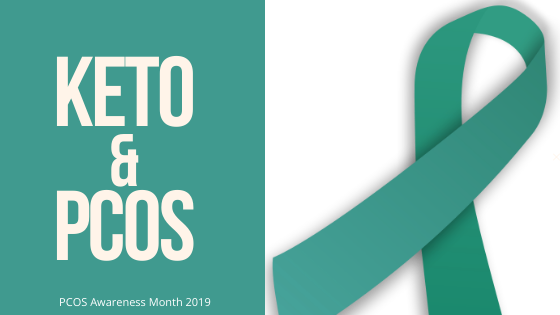Polycystic Ovary Syndrome, also known as PCOS, affects one in ten women of childbearing age. That means that in North America alone, about 10,000,000 women suffer from PCOS. The effects can be devastating. Insomnia, weight gain, infertility, and pain may be the tip of the iceberg. Those destructive symptoms of PCOS can last for years for some women, and diagnosis may also take a long time. It’s truly a life-altering medical condition. But can the keto diet help PCOS?
Causes and Treatments
Polycystic Ovary Syndrome is caused by a hormonal imbalance. The reproductive hormones are out of whack, and this can often mess with other hormonal processes such as your metabolism, which can impact weight gain. PCOS can make it hard to get pregnant because an egg may not be fully matured when it’s released into the fallopian tubes, or an egg may not release at all. The hormone imbalance can cause menstrual periods to be painful and heavy, and cause headaches.
There is no cure for Polycystic Ovary Syndrome. Treatment is often centered on correcting the hormone imbalance. While for some people, correcting PCOS is as simple as using bio-identical progesterone cream (I use an all-natural formula by Kokoro), for many sufferers, it’s just not that easy and working with a specialist is your best bet.
Low insulin levels and weight management are the most important facets of treating the symptoms of PCOS. Reducing your weight can reduce other symptoms, including headaches and heavy and/or painful periods.
PCOS and Insulin Resistance
As many as thirty to forty percent of women who have PCOS also have insulin resistance. Insulin is a hormone, and when there is any type of hormone imbalance in the body, other hormones under- or over-produce in an attempt to self-correct the problem. For people with PCOS, added insulin resistance can make it seem impossible to lose weight.
I can relate to that struggle. My own insulin resistance led me to try a variety of diets over the years. It wasn’t until I discovered keto that I managed lasting weight loss. I started using bio-identical progesterone cream years ago, and between that and keto, I no longer have PCOS. Please consult your doctor if you are considering bio-identical progesterone cream.
How can Keto Help PCOS?
Studies show that there are a variety of ways in which the keto diet can help alleviate the symptoms of PCOS. The link I’ve included here goes to a study, which I’ve broken down here into smaller, easier to digest bites.
- The keto diet shows better weight loss than other well-balanced diets. The keto diet suggests 20g’s of net carbs, but experts suggest 20g of ‘total’ carbs works must better for PCOS. Why? Because we want to keep our insulin levels as low as possible and net carbs can give us way more carb than we should have and our insulin levels will go up.
- Long-term, the keto diet reduces insulin resistance. This is huge because it’s a sign that hormones are returning to normal. Now, I’m not advocating that you stop taking medications cold turkey because you’ve been on keto six months and are feeling great. I am advocating that if you’ve been on keto for six months and are feeling great, having a conversation with your doctor about checking your hormone levels might prove beneficial.
- Also in the long-term, the keto diet can reduce the amount of androgen secretion. This is the hormone that likely threw everything out of whack for you in the first place! If the androgen secretion is slowed down, other hormones can operate at closer to optimum levels.
- Finally, keto can renormalize your endocrine functions. Once your hormone levels get back to normal, your entire endocrine system needs to adjust to everything working correctly. It’s kind of like when you drive your car and the front end goes slowly out of alignment. Over the weeks that this is happening, you will change how you use the steering wheel to keep your car going straight on the road. The change may be so gradual that you don’t even realize you’re doing it. Then once you go buy new tires and the front end is realigned, your new normal way of driving is suddenly way off of center! It can take a little bit to retrain yourself to drive the correct way. Your body works much the same. As you get your hormones to their optimum levels, your endocrine system must recalibrate. It may tweak levels of other hormones here and there until it gets everything right. This could be a rough few weeks for you. You may feel the keto flu all over again, or your eating habits may change. In time, your body will find a new, healthier normal. Again, this may be a queue that you need to make an appointment with your doctor to get your hormone levels tested. Letting certain hormones get too low can make you just as ill as you were before!
So yes. In the long run, the keto diet can help PCOS. It’s likely that you will need to spend several months on the keto diet before you see those changes in your hormone levels. As hokey as it sounds, it did take you a while to get unhealthy. It’s also going to take a while before you get healthy. You may see it happening in chunks. You may lose a lot of weight quickly, then see your weight loss slow down as your endocrine system tries to optimize its performance in a smaller, healthier body. You may find that it takes you longer to hit certain goals, including weight loss goals because your body is also busy healing hormone levels and the associated bodily processes.
Do you have questions about how the ketogenic diet could benefit your journey with PCOS? I would love to be able to help you find the answers! Stop by my Facebook group and we can chat more about your struggles and goals!
You got this!
Leta ~ Intentionally Bare
❗ Health information given here is based on public research and is not meant to take the place of your doctor's advice. Always do your own research before trying something new.


